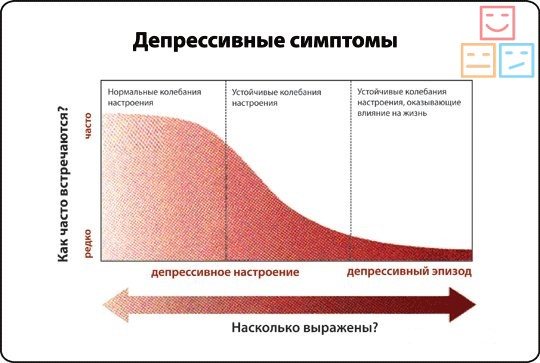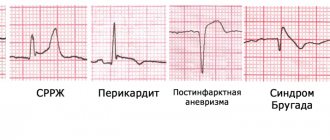Today, every fifth person, according to specialist research, has experienced depression in one form or another. Ordinary depression is a state of depression, bad mood, and a feeling of melancholy. Clinical depression is a completely different condition, which may not be accompanied by a bad mood at all, but has a whole range of other symptoms and is classified as a psychological disorder. Such symptoms interfere with normal life, work, study, and communication. If symptoms last a long time, more than two weeks, then you should think twice and consult a doctor.
Who is susceptible to the disease
Also known as clinical depression or major depressive disorder, this condition is one of the most common mental health problems in the country and around the world. Approximately 17.3 million people in America suffer from depression, representing more than 7% of the adult population. The condition is more common in women, who are twice as likely to suffer a depressive episode.
The disease occurs throughout life - from children and adolescents, to mothers (and fathers) experiencing postpartum depression , to the elderly.
Research shows the condition is growing fastest among teenagers and young adults. About 36% of girls will experience the clinical stage during adolescence, compared to 13% of teenage boys.
Symptoms and signs of clinical depression
Among the symptoms of clinical depression (or, in scientific medical terms, major depressive disorder) are:
- Bad mood during the day
- Loss of interest in life
- Lethargy and fatigue
- Inattention and indecisiveness
- Low self-esteem, self-flagellation,
- Thoughts of suicide
- Sleep and appetite disturbances
- Weight loss.
Among the causes of this disease are the acceleration of the pace of life, overcrowding in large cities, an increase in the level of social demands, stress, predisposition, and educational methods.
Many people are afraid to go to the doctor and voice the symptoms of their disease, because they think that this will negatively affect their future personal life and career. Patients believe that an official diagnosis will be like a sentence that will classify them as crazy. But this is not true at all!
And the experienced doctors of our clinic: psychotherapists, psychologists, psychiatrists will help you get rid of torment and prevent the negative consequences of the development of the disease. After all, the development of depression can cause great harm, and in particular, connections with other people will be destroyed, work will be lost, and a person can also commit suicide in this state.
During illness, changes occur at the brain level. It is sometimes very difficult for the patient himself to do anything to improve his condition.
The specialists of the Rehab Family center will not only prescribe the correct medication treatment, but will also conduct psychotherapeutic activities aimed at working through mental states. If treatment is started on time, the outcome of this treatment is usually quite successful.
Don’t wait for the person close to you to “come to his senses” and start acting. Help him make a decision and see a doctor. And the knowledgeable doctors of the Rehab Family clinic will already be able to establish successful interaction with the patient.
Consequences of advanced clinical depression
It is estimated that nearly 2 out of every 3 people struggling with depression turn to medication. If such measures are not taken in time, the disease can destroy a person’s life. The clinical condition increases the risk of substance abuse, disrupts relationships, interferes with the ability to succeed at work, and makes one more vulnerable to certain diseases. For example, people with depression are more likely to develop heart disease and are more likely to suffer a heart attack. Even more alarming is the fact that depression accounts for two-thirds of suicides.
What is organic depression?
Syndromes of this category accompany the course of senile dementia, progressive paralysis, mental retardation, and epilepsy. Organic depression is a disorder caused by structural changes in the brain, which have both somatic and other internal causes. A distinctive feature of an organic mental disorder is a disturbance of thinking and memory, accompanied by orientation disorders, the occurrence of false memories, and affective symptoms. In most cases, delusion is in the nature of denial.
Diagnosis of depression
To identify depression, patients are referred to see a psychotherapist by doctors of a narrow specialization - oncologists, neurologists, cardiologists. In the case of a patient’s independent treatment with manifesting symptoms of depression, the psychiatrist must establish the presence or absence of pathologies of somatic disease.
Diagnosis of a mental disorder associated with physiological and endocrine disruptions involves conducting a comprehensive physiological and neurological study, including:
- blood analysis;
- computed tomography;
- consultation with a neurologist.
If necessary, the psychiatrist prescribes additional tests for cancer and endocrine pathologies. Based on the results obtained and the characteristics of the patient, the specialist prescribes treatment.
Diagnostics and therapy
It is not uncommon for the condition to be misdiagnosed for other mood disorders (such as bipolar disorder ) or for conditions such as ADHD or even dementia. Incorrect diagnosis and improper treatment aggravate the patient’s condition and provoke more severe symptoms that constantly increase.
Traditional antidepressant treatment is effective for only half of patients with depression who recover after taking medication.
“The unfortunate reality is that current medications do not help everyone get better,” Thomas Insel, director of the National Institute of Mental Health.
Part of the problem is that traditional psychiatry typically takes a one-size-fits-all approach to diagnosis and treatment. But depression is not a single disorder, but a symptom of many mental disorders . Giving everyone the same treatment is not effective.
Depressive states occurred at the earliest stages of human development. Even in ancient myths and legends, manifestations of such conditions were described. Currently, the problem of depressive disorders is one of the most pressing in modern society due to the increase in both severe and less severe depressive conditions. Depressive disorders are often combined with somatic diseases and can be observed in patients with cancer, surgery, or vascular pathology. Depending on the reasons for the formation of depression and the personality characteristics of a person, different degrees of depressive disorders may manifest themselves from mild to severe. It is also possible that you will lose criticism of your mental state.
To assess the severity of a depressive state, both the clinical manifestations of the disorder are taken into account and special psychodiagnostic scales are used, for example, the Hamilton or Beck scale. With their help, you can determine the severity of depression, on which the choice of treatment measures will depend in the future.
Depression of moderate severity in the clinical picture is manifested by severe depressed mood, a significant decrease in ability to work and activity, inhibition of motor and mental processes, low self-esteem and even the occurrence of suicidal thoughts.
The most painful for the patient is prolonged insomnia, which is characterized by frequent awakenings, difficulty falling asleep, and lack of a feeling of rest. Its duration can reach several weeks and months, which leads to impaired attention, memory, inhibition of thought processes, perception of the world in pessimistic gray tones, and loss of the ability to carry out purposeful activities. Over time, the patient begins to experience a feeling of helplessness, the unreality of what is happening and hopelessness, which can lead to obsessive suicidal thoughts and attempts to commit suicide.
Moderate depression is also manifested by a decrease in the body's immune defense, which causes frequent infectious diseases. Restructuring of the functioning of organs and systems against the background of depression can manifest itself in a decrease in appetite, refusal to eat, and a pronounced decrease in body weight. An internal imbalance develops in the functioning of the functional systems of the whole body.
Depression of moderate severity does not undergo independent regression, and even with considerable personal effort, the patient cannot overcome it. Here it is necessary to prescribe special drugs from the group of antidepressants, and if depression is systemically repeated and aggravated by a difficult family situation, response to adverse weather conditions, then it is necessary to include drugs from the group of mood stabilizers, including those containing lithium, in order to increase the effectiveness of the therapy, create preventive and supportive effect. A good option in this case would be a new lithium drug - Normotim, created on the basis of lithium ascorbate, which has high bioavailability and safety, and has no side effects. Studies have shown the anti-anxiety and anti-stress activity of Normotim and the presence of a mild antidepressant effect. In addition, Normotim potentiates the effect of antidepressants, which allows you to get out of a depressive state faster by taking antidepressants in a lower dosage. Drug therapy should be supervised by a specialist who monitors the dynamics of the depressive state and is able to adjust treatment.
Some criteria
It should be noted that people who most often feel the pressure of objective life circumstances are a kind of risk group when it comes to depression. A person who is unemployed, experiencing increased financial difficulties (work is poorly paid, does not have his own home), working in an overly stressful or, on the contrary, boring job is a potential patient diagnosed with major depressive disorder.
A huge amount of stress and nervous overload also increases the risk of developing the disease.
A serious (although not one hundred percent) possibility of developing such a borderline state is the presence of experienced psychological trauma: death of loved ones, family breakup, betrayal, ruin, etc.
But the absence of visible circumstances does not mean that the disease cannot occur. Each person has individual characteristics of the body in general and the nervous system in particular. A serious condition quite often manifests itself without reasons obvious to others or the patient himself.
Causes and symptoms of organic depression
Behind the symptoms of an organic disorder lie brain pathologies:
- dementia;
- traumatic brain injury;
- epilepsy;
- circulatory disorders in the brain;
- vascular diseases of the brain;
- diseases of the nervous system;
- endocrine disorders;
- somatic diseases;
- toxic effects.
Depression of organic and psychological origin is similar in its symptomatic manifestations. The leading signs are: decreased mood, apathy, melancholy, spasmodic manifestations, sweating, changes in blood pressure and heart rate, impaired perception and memory, instability of the nervous system.
Distinctive features of depressive states that develop as a result of structural damage are the following symptoms:
- anxiety is not associated with psychological reasons;
- the patient’s medical history contains diseases or injuries of organic origin;
- presence of signs of hormonal imbalances;
- manifestation of neurological disorders;
- identifying symptoms of dementia.
The course of a psychogenic depressive disorder corresponds to the dynamics of the course of the underlying disease. Improving the somatic condition entails a weakening of depressive symptoms.

How is organic depression treated?
Treatment of this disorder is carried out by a psychiatrist together with specialists of other profiles. Specialist doctors select a treatment strategy for the underlying disease, and a psychotherapist selects an anxiety-depressive component. For these purposes, the following methods of psychology and psychotherapy are used:
- drug effects;
- holistic therapy, based on one-time work with the psychological and physiological aspects of the patient’s life;
- treatment using hypnosis;
- yoga;
- hydrotherapy;
- art therapy.
If it is impossible to carry out outpatient treatment, the patient is hospitalized in a specialized clinic. The main goal of psychotherapeutic correction is to stabilize the psychological state and emotional background of the patient.





